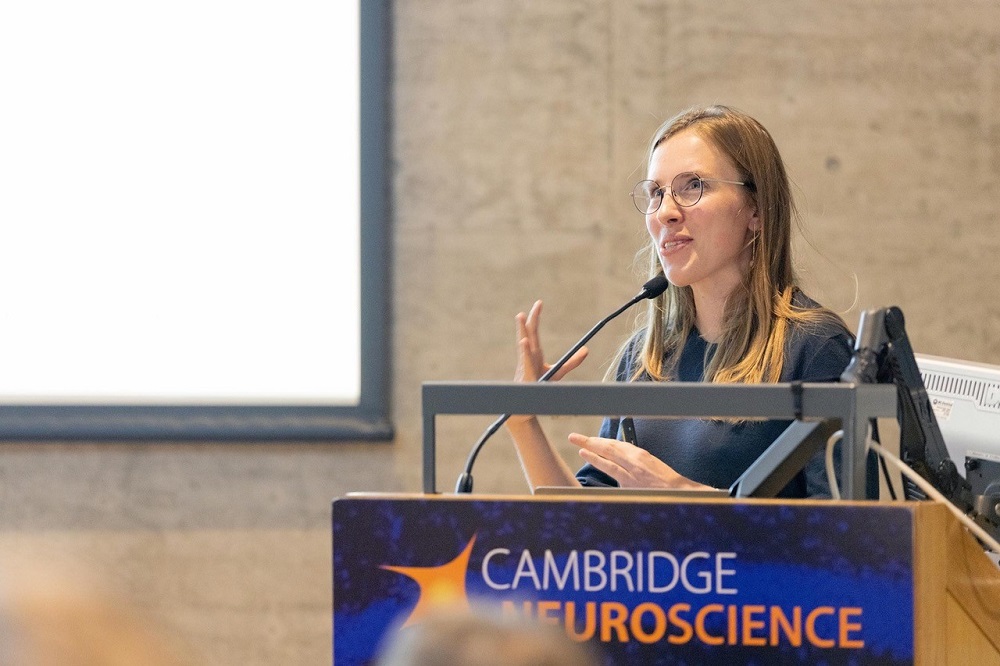Exploring the impact of digital technology on young people’s mental health
Dr Amy Orben is a College Lecturer and Director of Studies in Psychological and Behavioural Sciences, and she has been a Fellow at St John’s since 2023. She is also a Group Leader at the MRC Cognition and Brain Sciences Unit. In this interview with The Eagle editor, Ellie Collingwood, Amy discusses her work on the intersection between digital technologies and mental health in young people.
Please give us a brief overview of your research interests and tell us about the research team you lead.
My work tries to understand some of the factors that might be behind the decline in the mental health of young people that we’ve witnessed over the last decade. There’s general concern that digital technologies, which have become increasingly popular during that time, have something to do with it. My work specifically tries to understand whether digital technologies such as social media affect young people’s mental health and, if so, by which processes or mechanisms.
I have a team of about ten people, including myself, at the MRC Cognition and Brain Sciences Unit, which is a research unit at the University. My team comprises a variety of people, from those who specialise in statistics to those who are trained clinical psychologists, as well as PhD students from a variety of different disciplines.

What methods do you use to examine your hypotheses and what types of evidence do you use for your research projects?
My undergraduate degree was in Natural Sciences; I initially focused on Physics, but I moved into Psychology in my final year. I began using quite a data-driven way of working. My initial studies used large-scale, often survey, datasets collected by the government or big research teams tracking media use and wellbeing in tens of thousands of young people, but now that I have a team we use a wider range of methods. Some of my team members work directly with young people and go out into
schools to interview them and design interventions about how social media might be made better for them. I also have people conducting experiments, and a subsection of my team fits computational models (such as those used in machine learning and animal behaviour) to the behaviour that people exhibit on social media. Scientific teams often apply one method to a variety of research questions, but my team has one research question and uses a variety of methods to address it.
Have any results from your research projects surprised you?
There’s a common assumption that young people who struggle with their mental health might be more negatively impacted by social media, so we did a big review of the literature and looked at thousands of studies and we actually found no difference. So it seems like the correlation between social media use and mental health is the same for those with a diagnosed mental health condition and those without. We’re now doing a lot more research in that area, but the initial findings were surprising.
This is a topic that many people are discussing at the moment. Do you come up against recurring questions and preconceived ideas?
This is an area of great concern. Many people assert that social media is ruining childhoods or driving mental health conditions, and this is echoed by newspaper columnists and politicians, so the same
questions and concerns continue to arise. Historically, it’s quite common that with any new technology there’s a wave of concern about its impact on young people. In the 1940s there was apprehension about radio addiction and whether it might be akin to alcoholism. Now we see similar concerns about addiction to smartphones. Of course in many ways smartphones are quite different to the radio, as they’re specifically designed to grab our attention and to monetise that. So I do think that some concerns are warranted, but I often find that there’s a real disconnect between the evidence and data
and where the public conversation is. It’s definitely a difficulty of working in this space.

Have you found a demographic split in public opinion?
Well, survey data shows that children and young people are more likely to identify good and bad aspects of things like social media, while parents often agree that the negatives outweigh the positives. Young people often cite social connection and communication with friends as priorities, and so, while social media might also increase that pressure to present yourself in a certain way, they weigh up those things differently. There has also been a lot of research showing that there is a generational impact for all technologies – the older you were when they were first introduced, the more sceptical you are.
I have definitely seen a generational disconnect, and that’s why we’re talking increasingly to young people, because if we do design an intervention or recommendation, we need young people to buy into it for it to be effective. It’s very easy to shut down young people’s access to technology, but they’re quite ingenious here and can often outsmart the older generations anyway. So it’s about empowering the
positives while safeguarding them from the negatives.
What do you hope to get out of the UK Research and Innovation Future Leaders Fellowship?
The future leadership project provides at least four (and potentially up to seven) years of funding that will mainly allow me to recruit and retain very skilled team members. This will increase the speed of evidence gathering and allow us to be more responsive to questions from policy-makers,
governments or charities. We will complement much of the research we’re already doing with this more impact-focused approach to answer time-critical questions that arise from outside academia.
The funding will also allow me to recruit an adolescent advisory board that we’ll meet with regularly throughout the year to discuss the research we’re doing and get their input. What’s really nice is that this funding is quite flexible and long term. It allows me to work on the things that matter most at the time. And, because technologies change so quickly, that flexibility is vital. If you have to write a grant application, wait a year, recruit and then finally do the research, your research might well be three years out of date once it’s done.
So how do you keep up with changing technology?
I think that’s an existential question for researchers at the moment. We’re at a crossroad trying to understand what we can do to adapt and what our role should be. Are we supposed to hold technology companies to account or are we supposed to help design better technology? Over the next five to ten years, we need to do a lot of soul searching about what it is we want to deliver and what society wants university-based technology researchers to deliver.
In my team we don’t, for example, study particular social media platforms; what we study are particular designs. For instance, we study the effect of quantified social feedback, through ‘like count’ or comment count or the number of friends you have, and these ‘social status indicators’ are common across many different social media platforms, as well as certain gaming applications. This approach helps us to stay relevant against a backdrop of changing technologies.

What can individuals do to protect themselves and their loved ones when using technology and social media?
Social media and technology aren’t drugs that have a defined dose–response relationship. We can’t say that a specific dosage has a specific impact regardless of who you are. This makes it really difficult to give recommendations. For example, we can give alcohol unit recommendations because there is a specific dose–response relationship, and there are clear rules around medications for the same reason. It’s crucial to understand that a certain amount of time spent on social media will have very different impacts depending on the content viewed, who the person is and what they’re going through at
the time.
We need to keep communications pathways open to empower people to discuss openly the things they are struggling with online. For example, children should be able to feel confident that raising concerns won’t result in having their access revoked. That’s something young people are really concerned about.
It’s also important to have more open conversations across generations about what type of use is helpful and what is problematic for each individual, and to consider which tools are available to target the problematic types of behaviours. It’s important to be reflective.
We already have these sorts of conversations about diet. For example, there’s a big difference between eating a chocolate bar if you are diabetic or if you’ve just finished a marathon. As a society we have a lot more ways to talk about diet that can be positive or negative. It’s part of our life – we can’t stop eating and we can’t stop using technology. We need to move towards that way of talking about technology.
What are your predictions for the future of this field?
We’re currently training a new generation of scientists who have spent the vast majority of their lives online and who understand the deep complexities and the risks and benefits associated with that. I think that in the next few years we’ll see quite a large change in the field because of that. Already, undergraduates are fascinated by these topics and they have some very interesting ideas.
We’re also in the midst of massive technological change and researchers can’t just be stuck in their ivory towers wondering what niche research project they want to work on next. We need to consider our place in society and help to mould technological change to ensure it is having a positive effect on our world. We’re still finding our place there but we’re increasingly having the right conversations. Hopefully, the next generation will help us get a bit closer to that as well.

